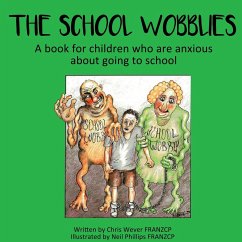Anxiety about going to school is a common problem for children and teenagers. It is part of a young child's normal developmental anxieties but becomes more abnormal as the child gets older. Anxiety based school refusal in older children and teenagers is a serious problem that needs to be treated promptly. It affects about 5% of children and teenagers. The longer it is allowed to go on, the harder it is to return the child to school. Missing out on school not only means the child misses out on education but also on other skills such as mixing with peers and developing more independence. There are a variety of factors associated with school refusal: the child may be anxious by temperament or there may have been traumatic events at school or worrying problems at home. An illness that has kept the child away from school can also be a trigger. Commonly, it is a combination of these things that starts the anxiety and school refusal. The main principle underlying good treatment is to teach the child or teenager that the anxiety will settle with time and it is very unlikely that anything bad will happen, despite the child feeling it almost certainly will. Such a program usually involves gradual desensitisation. The child is taken closer and closer to school and, at each stage, uses learned relaxation skills to reduce anxiety. When the anxiety subsides, the next stage can be attempted. Learning how to settle anxiety is a very important skill in many life situations. Some parents think it could be cruel to let their child experience any anxiety, but it is important to keep the child in the anxiety-provoking situation until anxiety subsides and the child can take credit for overcoming it. If the child always flees when anxious, it will be much harder for that child to learn to control anxiety and problems might get worse. Any anxiety problem deserves to be taken seriously, but it is often a mistake to think we have to be solemn just because something is serious. Inappropriate solemnity empowers the problem not the person. This book uses not so solemn cartoons to illustrate every idea. The cartoons use a wobbly cartoon couple to represent the thoughts and beliefs that drive school related anxiety. The Wobblies' methods are revealed so the child can learn to fight them and eventually banish them. With a serious problem like school avoidance, it's always a good idea to get expert assistance. You can do that by asking counsellors at the school or your family doctor for advice. You can also contact your community health centre or local association for mental health.








